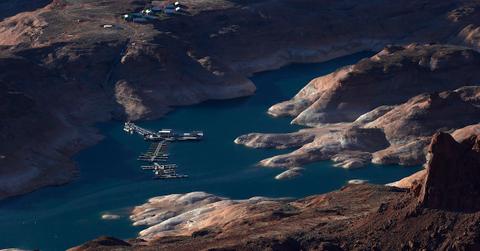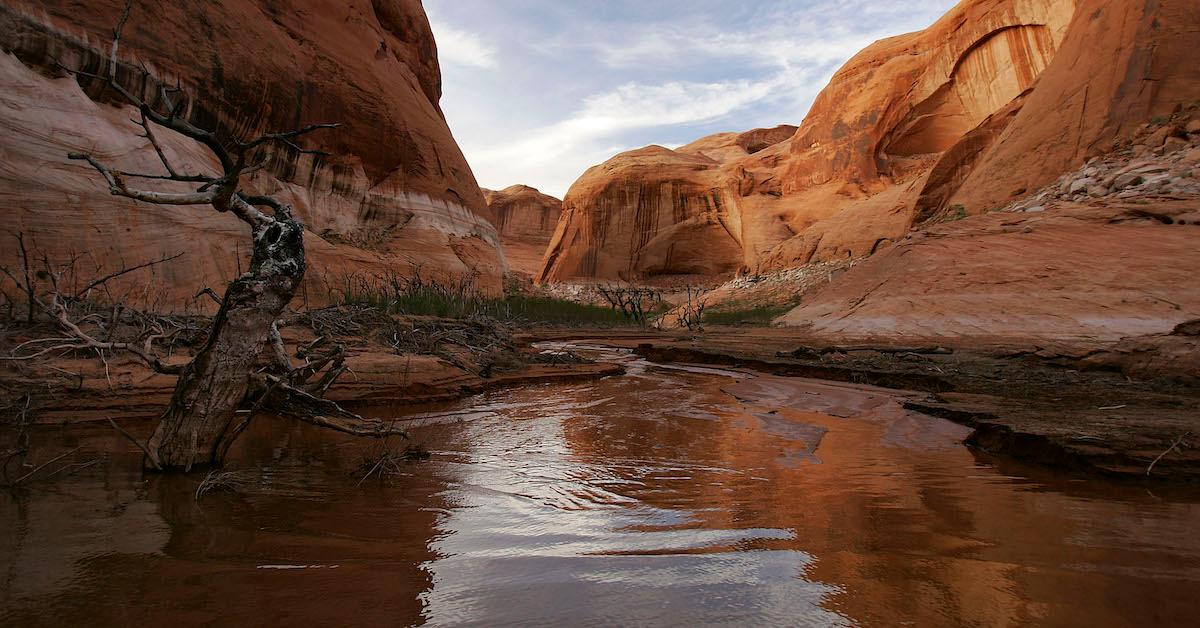Activists Are Protesting the Uinta Basin Railway, Which Would Transport Oil Across the U.S.
Published March 9 2023, 1:36 p.m. ET

Low water levels are visible at Lake Powell’s Dangling Rope marina on June 24, 2021 in Utah’s Lake Powell, one of the biggest reservoirs of the Colorado River Basin.
Not only are the processes of drilling for oil and burning oil harmful to the environment, but so is the process of transporting oil. And that's why many environmentalists are protesting the proposed Uinta Basin Railway, which would transport oil from Utah to various other places across North America.
Even though the company behind the new railway asserts that it is perfectly safe, there's no truly, 100 percent safe way to transport fossil fuels — as recent train derailments in East Palestine, Ohio and West Virginia have proven.
Keep reading for all the details on this proposed railway, and how it would harm the environment.

A train carrying crude oil burns while derailed on Dec. 22, 2020 in Custer, Wash.
What is the Uinta Basin Railway?
The Uinta Basin Railway is a proposed new train infrastructure that will connect the Uinta Basin (located in northeastern Utah) to the country's national railway network, as well as oil refineries along the coast.
According to The Guardian, the railway would be 88 miles long. It's estimated that it would quadruple the Uinta Basin's production of crude oil, producing about 350,000 barrels of oil every day.
"This common-carrier railway will move goods in a safe and cost-effective way to enable economic stability, sustainable communities and enriched quality of life," reads the website for the Uinta Basin Railway. The project is backed by Utah’s Seven County Infrastructure Coalition, which is a group of seven Utah counties.
However, climate campaigners disagree that the railway would be safe or sustainable.
The Uinta Basin Railway would harm the environment in endless ways.
In response to this proposed railway, activists have founded a campaign called Stop the Uinta Basin Railway.
The campaign website describes the railway project as "an oil train, an environmental disaster, a boondoggle."
According to the campaign website, this railway would emit up to 53 million tons of CO2 pollution every year.
"This oil train railway could unlock a frenzy of new drilling and quadruple oil extraction in the basin," the website reads. "This would be a trainwreck for the region’s air, water, lands, and wildlife. It would accelerate the already dangerous public health and environmental effects of global warming."
Additionally, every day, the railway would involve about five oil trains (each of which are about 2 miles long) traveling lengths of about 100 miles each, right next to the Colorado River.
As noted by The Guardian, about 40 million people and 30 tribal nations rely on the Colorado River for their drinking water, as does millions of acres of farmland.
If one of these massive trains derails, it would have devastating effects on the river and all those who depend on it.
And unfortunately, a derailment is likely, considering the fact that more than 1,000 trains derail in the U.S. each year, according to the Federal Railroad Administration via The Washington Post. And when these trains derail, they lead to oil spills, explosions, fires, public health crises, expensive infrastructure damage, and more.

A ring of bleached sandstone, the result of a six-year drought that has dramatically dropped the level of the reservoir, marks Reflection Canyon at Lake Powell on March 26, 2007 near Page, Ariz., near the Colorado River.
The Seven County Infrastructure Coalition has secured a $2 billion bond for the Uinta Basin Railway.
In March 2023, those against the construction of the Uinta Basin Railway grew even more frustrated with the looming project, when word broke out that the Seven County Infrastructure Coalition is expected to issue $2 billion in tax-exempt bonds to finance the railway's construction, as reported by The Salt Lake Tribune.
“If this goes forward it will be a triumph of corporate greed,” said Kristen Boyles of Earthjustice, as per The Guardian. “The fact that we continue to have disasters like East Palestine and near misses over and over again is a regulatory failure that demonstrates the absolute power of railroad industry lobbying.”
How would these bonds be tax-exempt? Eric Johnson, general counsel to the Seven County Infrastructure Coalition, explained that though the railway would be privately owned, it is technically sponsored by a public entity: the coalition. And because it's sponsored by a public entity, it is eligible for a tax-free loan, as per The Salt Lake Tribune.
It's not too late to stop the Uinta Basin Railway.
The federal government has already issued a Forest Service Permit to the coalition to build the railway — but Secretary of Agriculture Tom Vilsack has the ability to revoke the permit, "which would stop the project in its tracks," according to a petition by Stop the Uinta Basin Railway.
"Tell the Biden Administration to reverse the permitting of the Uinta Basin Railway to prevent environmental injustice and further exacerbating of the climate crisis," reads the letter to Secretary Vilsack.
If you'd like to get involved in the fight to stop this project from going forward, you'll find various resources on the "take action" page of the Stop the Uinta Basin Railway website. There, you can sign the petition asking Secretary Vilsack to revoke the railway's permits, plan an event protesting the railway, and more.